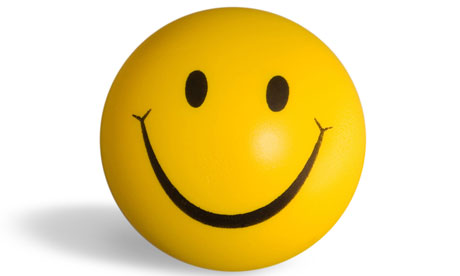
Whatever happened to happiness? David Cameron, remember, was not only going to make us happier, but measure the size of our happiness with some bizarre wellbeing index. If Broken Britain gets you down, cheer up: here comes Dave with his wellbeing calculator backed up by lots of the new economists of happiness. Many of them are very well meaning and have noticed that, after reaching a certain income level, people's overall satisfaction does not improve. They remind us about the importance of values other than material ones. That we became concerned with emotional prosperity just as the reality of economic austerity became apparent is surely not coincidental.
Happiness is easily and superficially defined, a bourgeois kind of contentment based on fulfilling work, close family relationships, community ties, active minds. Thus one may learn to produce happiness. The progressive position remains that societies with less inequality (always the richer, monocultural Scandinavian countries) are happier places than societies with a huge gulf between rich and poor.
Somehow, though, this analysis has gone awry. The all-purpose term "wellbeing" has been recast as an individual responsibility. Oh look, here's a self-help book on happiness. Are you a bit miserable because you spent years at college but have no job? Don't think negative thoughts! You will never be able to buy your own home, but look on the bright side, you can still enjoy some old-fashioned home-making crafts taught to you by posh women on TV. Baking, gardening, making bunting! Actually, there is little more depressing than having the simple pleasures preached to us daily by those who can afford very complicated ones.
If you are actually depressed, addicted, stuck and unable to function particularly well in an environment that requires you constantly to present a CV of extraordinary and extracurricular achievement, then what? There are anti-depressants or a burst of Cognitive Behaviour Therapy. The happiness agenda, propelled by thoughtful people, once centralised becomes a way of personalising what are really huge social problems. Just as the government believes we should all be physically healthy, and eat and drink in moderation, so too should we work on our own happiness at the exact time when many of us are anxious and insecure for reasons we are powerless to change.
Some of this psychology of happiness coincides with advances in neuroscience; we can see parts of our brains light up as we report positive feelings. But even science cannot deny the changing context. One has to be actively delusional to find many jobs fulfilling on any level. Happiness as imagined by the political classes is a particularly middle-class kind that assumes a stability many people never have. It is the job of government to create conditions of stability. That's it.
The happiness industry is often deeply conservative, for it is premised on how well-adjusted people's problems may be solved with a bit of behaviour modification or "willpower". All this is a massive form of denial. A denial of powerful forces from without and within. We do not have control over a globalised system that right now is in crisis, nor do we have full control over our own impulses, our own unfathomable psyches.
Watching David Cronenberg's new film, A Dangerous Method, about the relationship between Freud and Jung, was to be reminded that their insights remain as radical and disturbing as ever. Psychoanalysis, a body of theory gleaned, as the movie shows, from the repressed sexuality of many female patients, never set out to make people "happier", but simply to be able to live with themselves. Freedom enough. This work has been domesticated, so now we babble about egos and closure without considering the power of the unconscious or the great reserves of energy we use to repress so much of it.
One does not need to buy the whole psycho-analytic package to understand that the idea of the individual as a mixture of complex and competing drives is far less governable than that of a citizen whose "wellbeing" can be measured. It can explain why certain personalities are drawn to certain kinds of politics in a far more nuanced way than the idea floated so smugly this week, that somehow rightwing people are less intelligent.
Instead we might ask why those who are anti-state intervention want to legislate over sexuality, why the female body is the battlefield for the right, why people vote against their own class interests? Rightwing ideology is not "stupid", but founded upon certain kinds of repression and a view of human nature that sees the market as a pure expression of that nature.
Unpicking this can also explain why politicians who promise reassurance and control keep power. The happiness debate was but a distraction. An austerity government cannot create conditions for improved "wellbeing". This is a fantasy. In reality, "happiness" is subject to the cuts too. It has been privatised. You are, as you always were, on your own.

